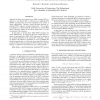Free Online Productivity Tools
i2Speak
i2Symbol
i2OCR
iTex2Img
iWeb2Print
iWeb2Shot
i2Type
iPdf2Split
iPdf2Merge
i2Bopomofo
i2Arabic
i2Style
i2Image
i2PDF
iLatex2Rtf
Sci2ools
ICASSP
2010
IEEE
2010
IEEE
On linear versus non-linear magnitude-DFT estimators and the influence of super-Gaussian speech priors
Although the linear mean-squared error (MSE) complex-DFT estimator, i.e., the Wiener filter, is well-known, its magnitude-DFT (MDFT) counterpart has never been considered in the context of speech enhancement. Therefore, certain theoretical questions regarding MDFT estimators remained unanswered. For example, it is unknown to which extend the performance of existing MSE MDFT estimators depends on the chosen speech prior, or on the non-linearity of the estimators. In this paper we present linear MSE MDFT estimators for speech enhancement. In contrast to the linear complex-DFT estimator, the presented linear MSE MDFT estimators do depend on the assumed distribution of the speech DFT coefficients. Based on objective and subjective experiments, it can be concluded that the chosen speech prior, i.e., Gaussian versus super-Gaussian has a significant effect on the performance of MDFT estimators, while the linearity as compared to non-linearity has only a minor influence.
| Added | 06 Dec 2010 |
| Updated | 06 Dec 2010 |
| Type | Conference |
| Year | 2010 |
| Where | ICASSP |
| Authors | Richard C. Hendriks, Richard Heusdens |
Comments (0)

